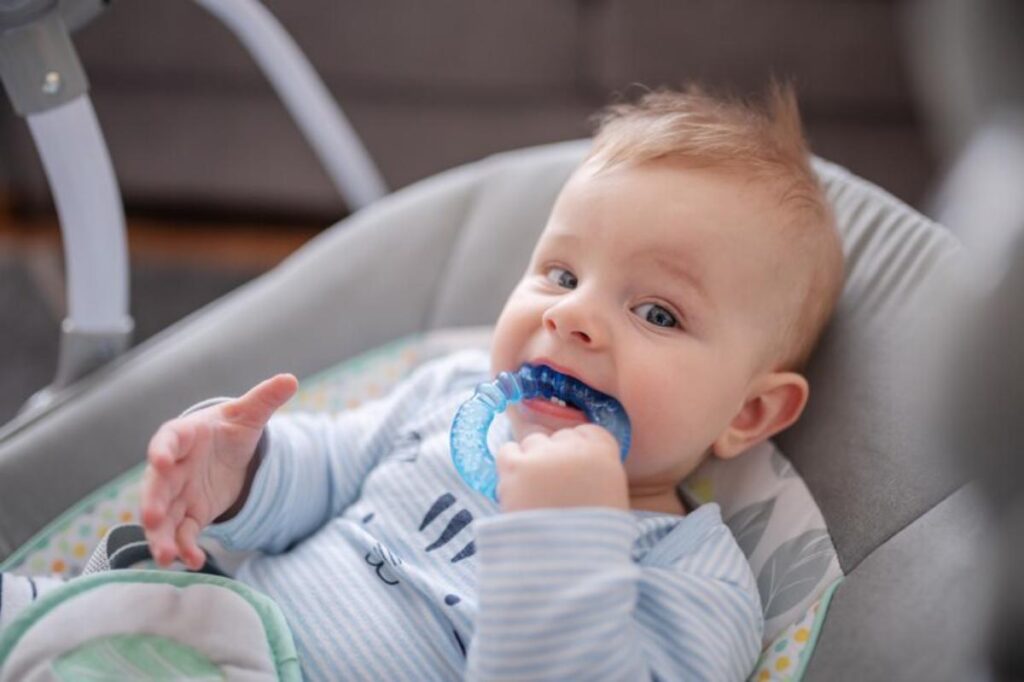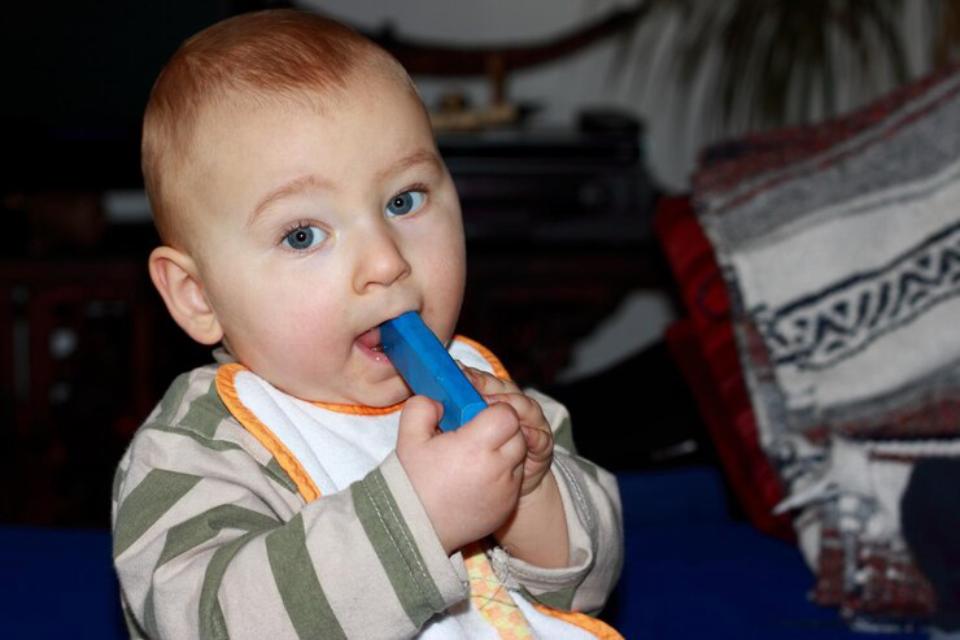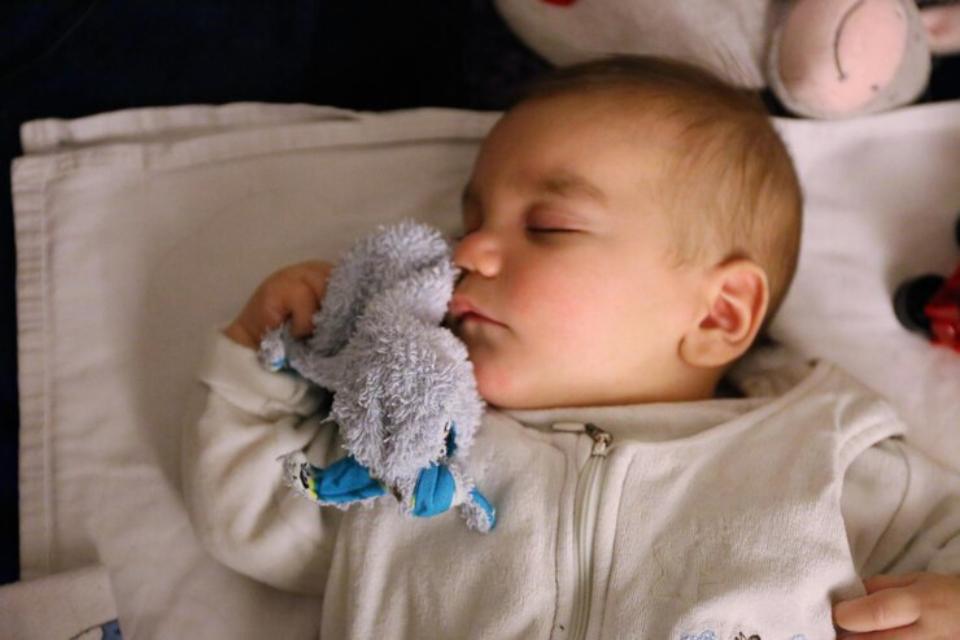The Parenting Blog

Teething and Sleep: How to Help Your Baby Rest
The moment your baby starts showing signs of teething — the endless drool, red cheeks, and constant chewing — you brace yourself. But what often catches parents off guard isn’t just the crankiness or the sore gums; it’s the sudden sleep disruption that can turn nights into battles and naps into short-lived miracles.
Teething can significantly affect your baby’s sleep. Those tiny teeth breaking through tender gums can cause discomfort that leads to frequent night wake-ups, shorter naps, and general sleep resistance. It’s tough for both baby and parent.
Key Findings
In this article, we’ll explore how teething impacts sleep, how to recognise what’s normal (and what’s not), and most importantly, offer soothing, realistic strategies that help your baby get the rest they need, while helping you preserve your sanity. Whether you’re dealing with a first tooth or battling through molars, you’ll leave with clear guidance and genuine reassurance.
Understanding the Teething Process
What Happens When Babies Teethe?

Teething usually begins between 4 and 7 months, though it varies from baby to baby. By their third birthday, most children have their full set of 20 primary teeth.
The most common signs of teething include:
- Excessive drooling
- Red or swollen gums
- Increased irritability
- Chewing on fingers or objects
- Mild temperature (below 38°C)
- Disrupted eating and sleep patterns
Some babies breeze through teething without issue. Others feel every bit of discomfort — especially when trying to fall asleep.
How Teething Disrupts Sleep
1. Increased Night Wake-Ups
Teething pain is often worse at night. Why? Because distractions are fewer, and lying flat can increase gum pressure. As a result, babies may wake more frequently, crying or fussing as they try to self-soothe.
2. Nap Resistance
You might also notice your baby fighting naps during teething spells. They may settle briefly but then wake up prematurely, sometimes wailing or agitated.
3. Restlessness and Light Sleep
Even when asleep, teething babies may move more, whimper, or seem half-awake. This is often due to discomfort during lighter stages of sleep.
How Long Do Teething Sleep Disruptions Last?
Generally, sleep disruptions tied to teething last for 3 to 8 days per tooth — most noticeably in the days before and after the tooth emerges.
But keep in mind:
- Teething isn’t constant. It comes in waves.
- Sleep patterns usually return to baseline once the tooth breaks through.
- If poor sleep persists for longer than two weeks, something else may be at play (e.g., illness or developmental regression).
Sleep Tips for Teething Babies
Create a Comfort-First Bedtime Routine
Your baby’s routine should offer comfort and consistency, especially during teething.
Consider this calming sequence:
- Warm bath with lavender or chamomile
- Gentle gum massage with a clean finger
- A teething-safe toy to gnaw on
- Calming music or white noise
- Rocking or snuggling in a dimly lit room
Repetition creates predictability, and that can be soothing when everything else feels off-kilter.
Try Safe Teething Remedies Before Sleep

According to the NHS and trusted paediatric sources, some safe options to relieve gum pain include:
- Silicone teething rings (chilled, not frozen)
- Cold washcloths to chew on
- Teething gels (if recommended by a GP or pharmacist)
- Infant paracetamol or ibuprofen for babies over 3 months — always follow dosing guidance
Avoid homoeopathic teething tablets or gels with benzocaine — both are considered unsafe for infants by health regulators.
Provide Comfort Without Creating New Habits
It’s tempting to rock or feed your baby to sleep every time they stir. And sometimes, you absolutely should — especially during painful nights.
But try to balance that with gentle, responsive settling techniques:
- Offer a reassuring touch or voice before picking up
- Allow a minute to see if they can self-soothe
- Reapply sleep cues like white noise or pacifiers
- Keep the room dark and interactions low-key
This builds your baby’s confidence in resettling, even during discomfort.
Differentiating Teething from Other Sleep Setbacks
Sometimes teething gets blamed for every disrupted night — but it’s not always the culprit.
How to Stay Sane When You’re Sleep-Deprived
Let’s not forget: you need sleep too. But during teething, getting uninterrupted rest can feel like a luxury.
Here’s how to cope:
- Take turns at night with a partner or support person
- Nap when your baby naps — even if only for 20 minutes
- Prepare quick snacks and keep water close at hand
- Lower your daytime expectations (and remind yourself this is temporary)
Sleep deprivation is hard. But your calm, consistent presence is the greatest comfort your baby can have during this rocky patch.
And if you’re juggling other sleep challenges too, our guide on how growth spurts affect infant sleep patterns may offer added insights.
Building Resilience in Sleep Routines
As teething waves pass, many parents worry about whether they’ve “undone” all their previous sleep progress.
The truth is:
- Babies are resilient
- A few rough nights won’t permanently derail healthy sleep habits
- Once your baby feels better, gentle routines can be reinforced
If you’re concerned about long-term disruptions, our article on what to expect during the 4-month sleep regression explores helpful recovery strategies and real-life examples.
Soothing Sleep Through the Teething Storm

Teething and sleep rarely go hand in hand. When your baby is in pain, their sleep — and yours — takes a hit. But understanding how and why this happens empowers you to respond with calm, confidence, and compassion.
By tuning into your baby’s needs, offering safe pain relief, and keeping sleep routines gentle but consistent, you lay a strong foundation — not just for sleep, but for trust and comfort.
It won’t be like this forever. Every tooth is one step closer to easier nights and brighter mornings.
So hang in there — you’re doing a brilliant job, even on the hardest nights.









